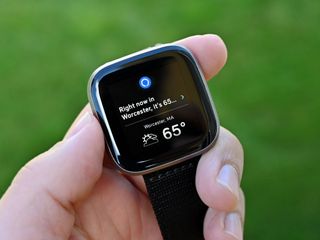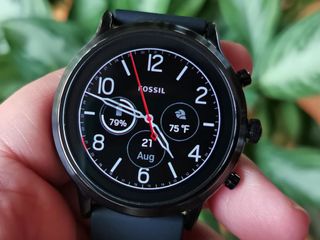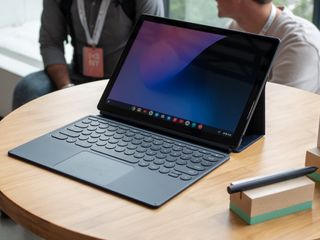Why Google buying Fitbit is a rotten deal for everyone
Google has a poor history with acquisitons and hardware. Here's why Fitbit only sounds good on paper.

Google is officially acquiring Fitbit. The move makes sense for Google – at least in theory. According to Canalys, Apple shipped three million Apple Watches last quarter while Fitbit pushed nearly two million. Fossil – the biggest maker of Wear OS watches – shipped just three hundred thousand. You can understand why acquiring Fitbit could place Google much closer to Apple in one fell swoop.
However, the deal is a blow to fans of Fitbit and its nearly 12 years of independence. Of course, the irony is not lost on me, as fans of Pebble felt the same about its acquisition by Fitbit years ago. But putting pride aside, there is also little reason to celebrate either.
Google's graveyard and Fitbit's future

Although Microsoft garners a lot of criticism for canceling products, Google is not immune from it either, even poking fun at itself recently. There's an entire site dedicated to remembering the more than 150 services, 18 apps, and 16 hardware ventures Google has axed over the years. It's not pretty.
And then there is Motorola – bought in 2011 by Google and quickly dumped in 2014. That move comes off more as a defense against Samsung than a strategic boon to Google, who squandered most of it.
The Fitbit acquisition is not about catapulting Wear OS to beat Apple; it's full-on defibrillation of a dying patient.
But the past is not always prologue. Google is gaining a massive assortment of patents and know-how from Fitbit, and more importantly, nearly a decade of user data. Google could very well – as it said it would – finally create Made by Google wearable devices under the auspices of this Fitbit acquisition. There is a slight chance that somehow Google can take the best of Wear OS (if there is any) and merge it with the fitness and health mastery from Fitbit.
I am skeptical. Google has had five years with Wear OS. Whether it is the anemic operating system, or the more significant problem, Qualcomm's lackluster processors, it has wasted almost all of it. ASUS, Motorola, Huawei, and Samsung have all paired down Wear OS devices or abandoned them for their own proprietary systems. What remains is Fossil dominating lesser brands like Casio, Tag Heuer, Polar, and Mobvoi (which is backed by Google).
The Fossil 5 is a contender. It is easily the best Wear OS device I have used. But the OS still asks for too many compromises for good battery life, sloppy app execution, and overall innovation that keeps it from greatness. Adding Fitbit mojo doesn't change that.
Get the Windows Central Newsletter
All the latest news, reviews, and guides for Windows and Xbox diehards.
The Fitbit acquisition is not about catapulting Wear OS to beat Apple; it's full-on defibrillation of a dying patient, a Hail Mary to rescue years of failed policy by Google. Why expect anything different this time?
Fitbit + Google is like mixing oil and water

Fitbit's customized "OS" and Google's Wear OS are vastly different beasts. There is no mixing of them. What it could mean is we get Wear OS, but now with a dash of Fitbit health and fitness magic. That's cool, but does that move the needle against Apple? Does this change the fundamental issues underlying Wear OS – mediocre performance, poor app execution, and Google ignoring the platform? Even if everything goes right, the Pixel 4 exposes how tone-deaf Google can be when making its own hardware.
All of this has a familiar ring to it. Google buying Fitbit sounds like a good idea, but Google currently does not have an excellent track record in wearables, and combining two mediocre platforms does not create an Apple Watch killer. It gets you the Pixel Slate.
Does this change the fundamental issues underlying Wear OS? No.
And for those worried about Google absorbing a decade's worth of your health data, at least they have (for the time being) committed to not selling that data for ads. Google can change its mind like it did with Nest, in effect forcing users to merge Nest data with Google. Some users did not like having their home data subjected to Google's privacy policy, even if not ad targeted.
Google's purchase of Fitbit is not a great one for consumers. I see one of the most creative wearable brands with a robust community dying and my data going to a company that has trust issues. Putting those concerns aside, there is now even less competition in the market, and that's boring too.
Maybe it's time for me to give Withings another shot. Or maybe hope against hope that Microsoft has a Surface wearable coming with the Surface Duo.

Daniel Rubino is the Editor-in-chief of Windows Central. He is also the head reviewer, podcast co-host, and analyst. He has been covering Microsoft since 2007, when this site was called WMExperts (and later Windows Phone Central). His interests include Windows, laptops, next-gen computing, and watches. He has been reviewing laptops since 2015 and is particularly fond of 2-in-1 convertibles, ARM processors, new form factors, and thin-and-light PCs. Before all this tech stuff, he worked on a Ph.D. in linguistics, watched people sleep (for medical purposes!), and ran the projectors at movie theaters because it was fun.
